Support justice-driven, accurate and transparent news — make a quick donation to Truthout today!
Yusef Salaam, who was wrongly convicted and later exonerated as a member of the “Central Park Five,” has won a seat on the New York City Council.
In 1989, Salaam was one of five Black and Latino teenagers who were falsely accused of raping and beating a white woman in Central Park. The teenagers admitted to the crime under the duress of exhaustion and coercion by the New York City Police Department. They later recanted their admission, but were still handed down 13-year prison sentences.
In 2002, the true perpetrator of the crime confessed, and DNA evidence further confirmed that none of the Central Park Five took part. The sentences of the Central Park Five — Salaam, Korey Wise, Kevin Richardson, Raymond Santana and Antron McCray — were vacated later that year.
Salaam, who was 15 at the time of his arrest in 1989, easily won his election on Tuesday, running unopposed in a central Harlem district after winning his Democratic primary race earlier this year. He will serve a four-year term on the council.
“For me, this means that we can really become our ancestors’ wildest dreams,” Salaam said in an interview before being elected.
Shortly after the five were arrested, former President Donald Trump — then a popular real estate mogul living in New York City — took out a full-page advertisement in The New York Times and three other local papers, describing the teenagers with racially coded terms and urging state lawmakers to reinstate the death penalty.
Even after the five were proven innocent, Trump refused to apologize for his action— and in 2019, after the release of a Netflix show about the Central Park Five, Trump once again suggested that Salaam and the others were guilty.
“You have people on both sides of that. They admitted their guilt,” Trump said that year.
Barry Scheck, a lawyer who worked on the legal team representing the Central Park Five and a founder of the Innocence Project, condemned Trump’s comments in 2019.
“It’s shocking and deeply troubling that after all of these years, he would not have recognized that by calling for the reinstitution of the death penalty, it contributed to an atmosphere that deprived these men of a fair trial,” Scheck said.
As part of his campaign this year, Salaam has vowed to combat gentrification in Harlem and advocate for policies to address poverty. His experience being falsely accused as a teenager — including serving out seven years of his prison sentence before being freed — has given him unique insight into the struggles faced by his constituents, he said.
“I am really the ambassador for everyone’s pain. In many ways, I went through that for our people so I can now lead them,” Salaam said during the campaign.
Media that fights fascism
Truthout is funded almost entirely by readers — that’s why we can speak truth to power and cut against the mainstream narrative. But independent journalists at Truthout face mounting political repression under Trump.
We rely on your support to survive McCarthyist censorship. Please make a tax-deductible one-time or monthly donation.
